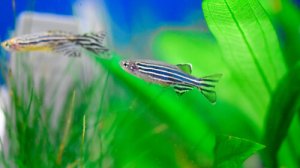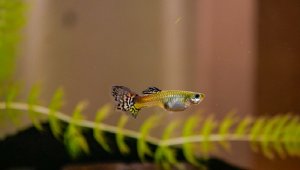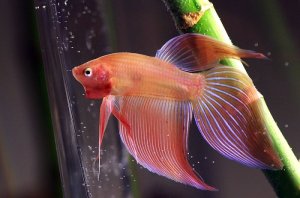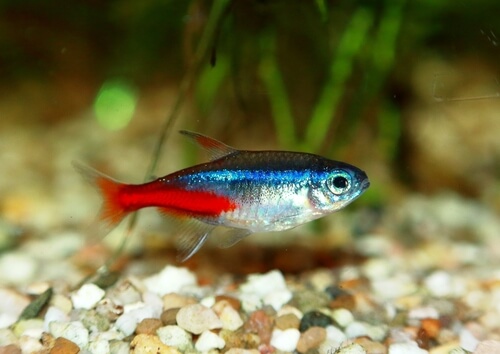
Brightly colored neon tetras make for excellent pets with their easy going mannerisms. However, witnessing your neon tetras dying can be pretty disheartening. Even if they are well cared for, neon tetras can fall victim to certain conditions that can kill them. By being aware of the most frequent causes of neon tetra deaths, you can avoid future deaths.
Why Are My New Neon Tetras Dying
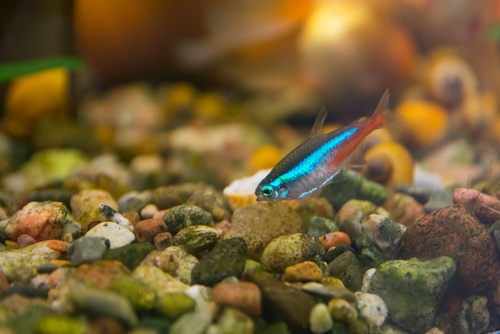
1. Dangerous Water Quality
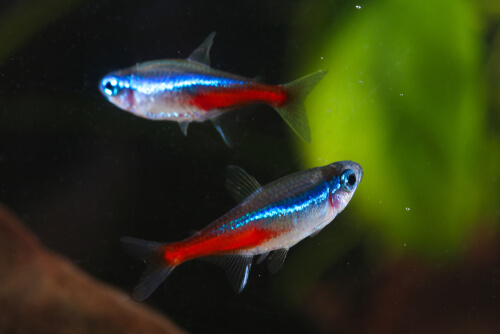
The filthy and toxic water in your tank could be one factor contributing to why your neon tetras are dying. How you manage the waste in your aquarium has a big impact on the water quality. Uneaten food, fish discharge, and dead fish are a few examples of waste you will find in a tank.
Biological waste is highly toxic to fish because ammonia is released as it starts to break down. To prevent neon tetras dying suddenly, it’s essential to maintain healthy water. Having a testing kit on hand to determine your water’s parameters is a fantastic idea.
2. Other Toxins
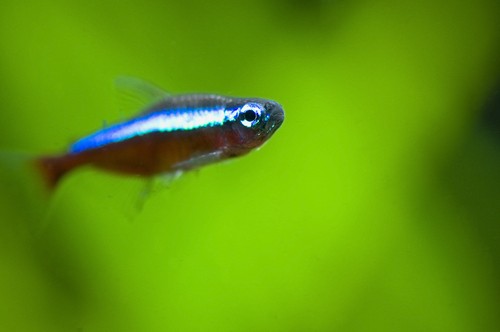
There are other substances besides ammonia that could have you asking why are my new neon tetras dying. Many strange substances and products can make the water in your aquarium hazardous. Neon tetras can be killed by even minimum quantities of harmful pollutants, such as insect spray, soap, lotions, perfume, and cleaning agents.
Cleaning agents that can contaminate your tank during a water change are the most typical cause. You must be careful to never wash buckets or tanks that your neon tetras are kept in with cleaning solutions. This is because even the smallest amount of cleaning solution in the tank water might harm your fish permanently.
3. Your New Tank Isn’t Ready For The Tetras

Be very cautious when adding new neon tetras to the environment if you’ve recently constructed a brand-new tank with brand-new gravel and a fresh filter. In new tanks, ammonia and nitrite levels can reach dangerously high levels. This is because nitrifying bacteria usually keep the amounts of ammonia and nitrite in check, but new tanks frequently don’t have enough bacteria to achieve this.
It takes time for the nitrifying bacteria to multiply and spread in new tanks. Therefore, adding too many fish into the tank at once can be dangerous as there may not be enough bacteria to help break down the toxins from the waste.
4. Stressed Neon Tetra
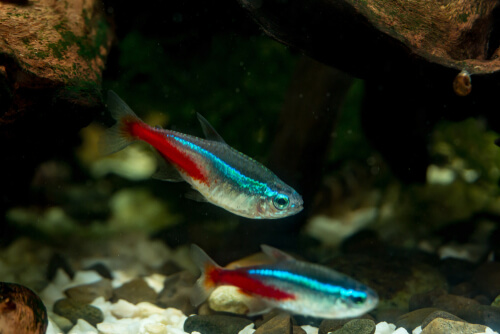
Neon tetras are much more fragile than some of the other fish in your tank. As a result, your tetras’ immune systems can be weakened by prolonged stress, which could be why your neon tetras are dying. As a result, you must take the necessary steps to keep your tetras’ stress levels as low as possible. If you don’t, they are more likely to become ill and struggle to recover.
When your neon tetras are stressed, they will constantly hide, swim along the glass, fight, and spend lots of time at the bottom of the tank. Stress can come from various factors, including inadequate water quality, bullying, undersized tanks, crowding, and incorrect feeding.
5. Overfeeding
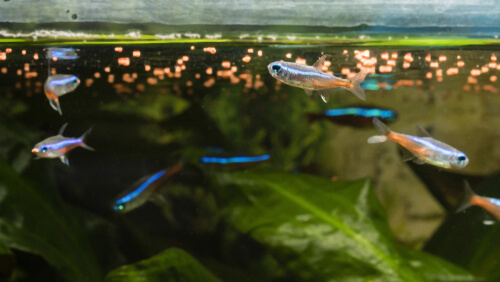
Overfeeding is a more significant issue than most fish owners realize. As a result of being given excessive amounts of food, it is typical to have neon tetras dying. The first problem is that your pets begin to experience health problems like constipation and swim bladder disease due to overfeeding.
Secondly, unfinished food rotting at the bottom of the tank will cause the water’s ammonia levels to rise. To avoid this, feed your fish enough food they will consume in two minutes. This will limit wastage and avoid overfeeding.
6. The Water Is Too Cold For Your Neon Tetra
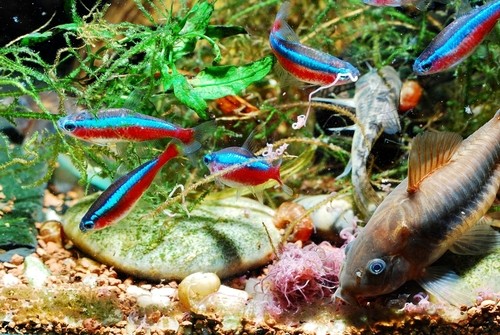
Like all other tropical fish, neon tetras need warm water conditions to survive. Because they are cold-blooded, these fish need warm water to control their metabolism. Anywhere between 72 and 80 degrees Fahrenheit is their preferred temperature range. An essential part is that the levels must always remain steady.
Temperature fluctuations can cause shock, anxiety or eventually lead to a number of diseases. Significant temperature changes can be one of the reasons for your neon tetras dying. Ensure your tank has a good thermometer to monitor the temperature of the tank.
7. Your Fish Is Sick
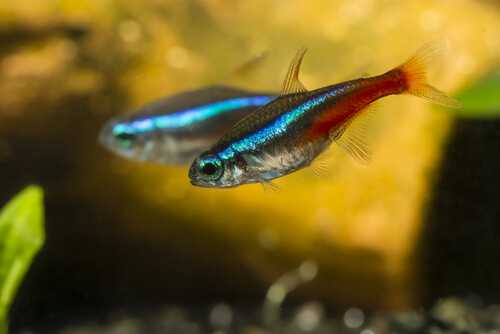
One of the most terrifying aspects of owning a fish tank is that your pets can get sick at any time. Your aquarium as a whole could be in danger if one of your fish gets sick. Neon tetra disease, which the Microsporidian parasite produces, is one of the most well-known neon tetra disorders. Contrary to its name, the condition can also affect other fish species, such as rasboras, angelfish, and barbs.
If your neon tetra has this disease, you will likely see signs of stress, loss of color, cysts, and swimming difficulty. This is a highly contagious disease and should be treated immediately. If you have eliminated neon tetra disease from your list of possible reasons for ‘why are my new neon tetras dying’, then look for signs of other diseases like mouth fungus, columnaris, dropsy, velvet, and hemorrhagic septicemia.
How To Prevent My Neon Tetras Dying
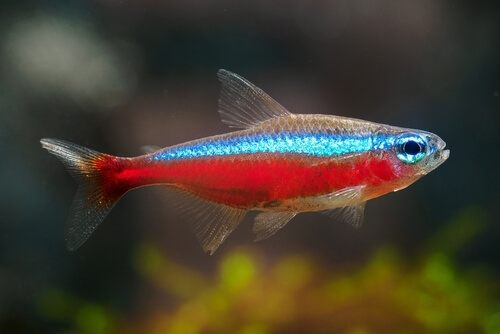
- Water quality – Test your water quality regularly using test kits. The pH levels should ideally be between 6.8-7.8, and temperatures should be 72-80 degrees. In addition, install a filter to keep the water filtered.
- Control the stress – If stress is what is bothering your neon tetra, it is a good idea to add places to hide, like plants and ornaments. Also, watch out for bullying, as this becomes a significant factor if your tank includes aggressive tank mates.
- Treat all illnesses immediately – If your neon tetra appears pale, lethargic, underweight, or uninterested in food, this could be a sign of illness. It is best that you quarantine them and administer the appropriate treatment for whatever they might have
To Summarize
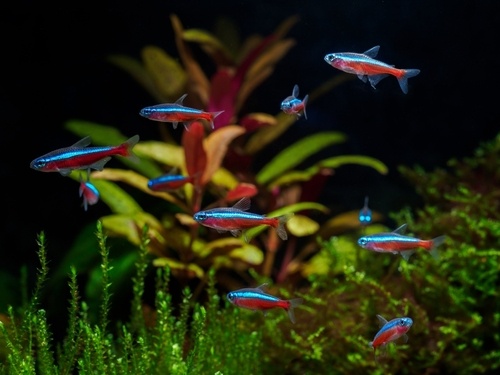
Although it is always heartbreaking, it is not uncommon for these exquisite, tiny fish to experience difficulties due to certain unpleasant circumstances. However, these undesirable events can be readily avoided with the right equipment and regular tank maintenance. If you’re looking for solutions to your problem, you should be able to keep your neon tetras healthy by using the advice provided in this article.


